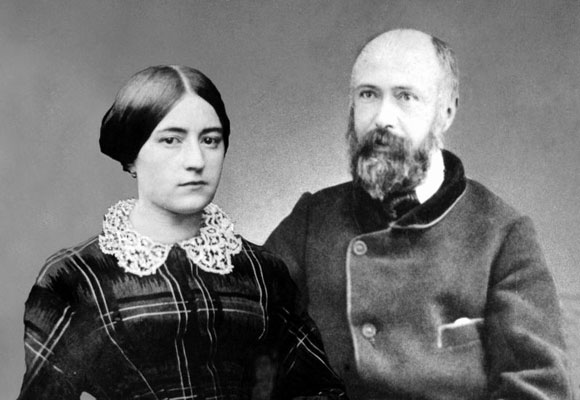By Rose Leigh
Photo from https://www.littleflower.org/st-therese/who-is-st-therese/#st-thereses-parents
St. Louis Martin
Watchmaker, husband, and father
Born August 22, 1823
Died July 29, 1894
St. Zélie Martin
Lacemaker, wife, and mother
Born December 23, 1831
Died August 28, 1877
Joint Feast Day: July 12
Of One Heart and Mind
The French saints Louis and Zélie Martin are perhaps most famous as the parents of St. Thérèse of Lisieux, but their own stories are less well-known.
As a young woman, Zélie Guérin had wanted to be a nun, but that had turned out not to be God’s will for her. Instead, she was now running a business making beautiful Point d’Alençon lace and praying for the husband and children she hoped God would give her one day.
Walking across a bridge one day, she spotted Louis Martin. As she looked at him, she was struck by the dignity in Louis’s expression and bearing. Then she heard God tell her, “This is he whom I have prepared for you” (p. 3).
Almost a decade older than Zélie, Louis had also previously aspired to religious life and was now a watchmaker by trade. He was now content being single and didn’t really plan on getting married. But when he and Zélie got to know each other, they quickly recognized how suited they were to each other.
Their mutual focus on placing God first was the best foundation their marriage could have. A vicar who knew the Martins said that, “In their family life, the union was remarkable, both between the husband and wife, and between the parents and the children” (The Mother of the Little Flower, p. 10). Louis and Zélie were married on July 13, 1858.
Sanctifying Familial Love
Unlike many parents, who want grandchildren and don’t like the idea of ‘losing’ their children to religious life, Louis and Zélie hoped for a son who would become a priest. In a letter, Zélie wrote this about her children: “We lived only for them; they were all our happiness and outside of them we desired no other. … And so I desired to have many of them in order to present them to heaven” (The Mother of the Little Flower, p. 9).
The couple had nine children together, but two of their daughters and their only two sons died very young. These losses were heartbreaking, and Zélie worried during every pregnancy. Although the particular hope for a priestly vocation among their children didn’t happen, their five surviving daughters (Marie, Pauline, Léonie, Céline, and St. Thérèse of Lisieux) all entered religious life.
Many Catholic children are sent to religion classes but don’t experience the Faith in any meaningful way at home, which often results in fallen-away Catholics. But Zélie was determined that her children would become saints. She personally undertook their religious formation—praying with them, helping them prepare for Confession, keeping them away from poor influences, and gently but firmly teaching them to overcome their faults. She could be strict in these areas, but generally she was motherly and gentle towards her daughters, and of course prayed for them constantly.
Louis and Zélie prioritized family prayer, daily Mass, frequent Confession and Communion, and personal mortification in their personal lives and in the life of their family. But both parents also loved to play, take walks, go fishing, and travel with their children.
Zélie was always busy. She worked tirelessly at her lace business, managed household servants, cooked and kept house, cared for her children, and wrote letters. The lace business allowed the Martin family to live comfortably, but Louis and Zélie never got attached to wealth or class. They gave their time and money generously, dressed simply, closed the shop on Sunday, and personally cared for their lace workers and servants when they fell sick.
Resignation to God’s Will
In her forties, Zélie discovered that she had untreatable breast cancer. She went on a pilgrimage to Lourdes to pray for healing, but patiently accepted the suffering and the disappointment when she was not cured. “I wish that you would not worry too much about me, and that you be resigned to the will of God,” she wrote in one of her many letters to friends and family during this time. “If He found me very useful on earth He would certainly not permit me to have this illness, for I have prayed so hard not to be taken out of this world as long as I should be necessary to my children” (The Mother of the Little Flower, p. 91). After a long illness, she died when she was just forty-five.
Louis was left to raise their five daughters. The older girls helped take care of the younger ones (Thérèse was only four), but Louis also decided it would be good to move closer to relatives in Lisieux.
Louis was a loving father and a true gentleman. St. Thérèse’s autobiography The Story of a Soul includes many stories of Louis playing with his daughters, speaking with them about the Faith, and being respectful to everyone he met (even people who directly insulted him). In contrast to Zélie, Louis had a more reserved, thoughtful temperament. He arranged a special spot in the house where he would go alone to pray and read, imitating the life of the monks he had once wished to join.
When each of Louis’ daughters in turn was called to be a cloistered nun, it was naturally painful to part with them, but he was joyful knowing that these vocations were God’s will. He even made special trips with Thérèse to visit the Superior of Carmel and then the bishop, so that she could request to join the Carmelites at the unusually young age of fifteen.
At the end of his life, Louis suffered for three years from cerebral arteriosclerosis, offering up the humiliation and pain to God. In The Story of a Soul, St. Thérèse recounts a meeting with her father after she had entered the Carmelite convent.
You remember when, in this very parlour, he said to us: “I’ve come from Alençon and the church of Notre Dame. There I received such comfort and such graces that I prayed: ‘O Lord, it is too much. I’m too happy. I can’t go to heaven in this state. I want to suffer for You.’ And I offered myself as…” The word “victim” died on his lips… (p. 90).
Many people with terminal illnesses only think to pray for healing. But illness and pain are opportunities to grow in virtue and offer up suffering to God, for the salvation of our souls and the souls of others. Louis offered himself up in a radical way, knowing the benefit it would give to his soul.
Saints Together
After St. Thérèse’s autobiography was published, people began to call for her parents’ cause for canonization to be investigated. During the beatification process, their daughter Pauline said, “My parents always seemed to me to be saints. We were filled with respect and admiration for them. I sometimes asked myself if it were possible to find their equals on earth. Around me I could see nothing like them” (The Mother of the Little Flower, p. 29).
More than a century after their deaths, the couple were canonized together in 2015. Their daughter Léonie’s cause for canonization has recently been opened as well.
Ordinary life presents plenty of opportunities for holiness, if we only look for them. Having a religious vocation isn’t a requisite for sainthood, and there are several married couples who have both been canonized. We can call on Louis and Zélie’s intercession when we experience hardships and suffering in our family, and ask for the grace to surrender ourselves fully to God’s Will.
SS. Louis and Zélie Martin, pray for us!
Read more about Louis and Zélie Martin:
- Céline Martin wrote two books about her parents, The Mother of the Little Flower and The Father of the Little Flower
- Call to a Deeper Love: The Family Correspondence of the Parents of Saint Therese of the Child Jesus (1864-1885) is a compilation of Louis and Zélie’s correspondence
- St. Thérèse’s autobiography The Story of a Soul includes stories about her parents
- Biographical profile of the couple on the occasion of their beatification
- Article on Aleteia.org about the couple’s single lives before marriage
- Article from Crisis Magazine about life in the Martin household
- Brief biography on LittleFlower.org
- Biography from St. Thérèse Catholic Church in California

Rose Leigh
Rose has been drawing and writing since she could hold a pencil, creating worlds of giants, fairies, and adventurers from her imagination. She works as a graphic designer and loves discussing the good and creative aspects of literature, art, and film.






0 Comments